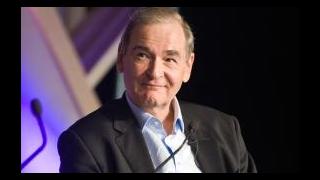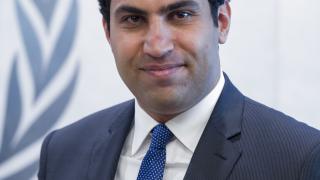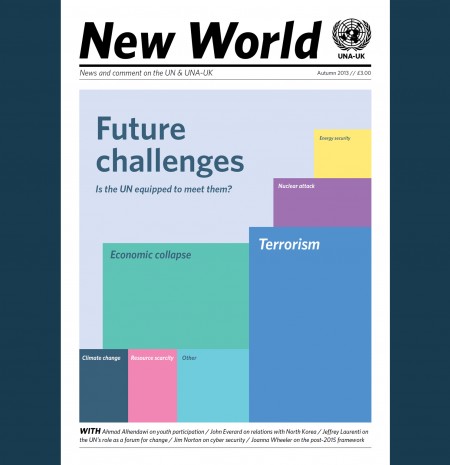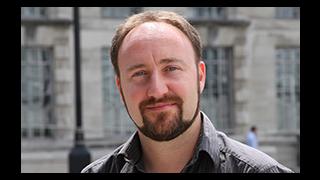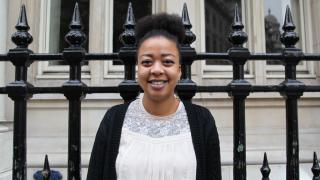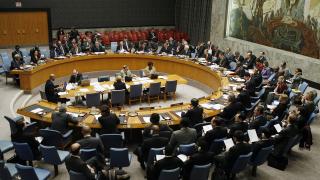
The recent crisis over Syria seemed once again to spotlight United Nations fecklessness and irrelevance. Even the US president, who won the 2009 Nobel Peace Prize for his “emphasis on the role that the United Nations and other international institutions can play”, dismissed Security Council resolutions as “hocus pocus”.
Then a funny thing happened. Plans for a UN bypass crumbled in the face of public resistance in each of the Security Council’s three Western permanent members. The House of Commons derailed UK government plans to join military action, Barack Obama found himself stymied by intense public and Congressional opposition and François Hollande declared that France wanted to wait for the UN weapons inspectors’ report after all. Then Russia offered a proposal for the UN control and destruction of Syria’s chemical weapons stockpiles that seemed to offer a solution – ironically, a UN solution.
In short, the United Nations, like a Japanese daruma doll, keeps popping back up even after it is supposedly knocked down for good – whether over Bosnia, Kosovo, Iraq, or now Syria. For all its infirmities and limitations, it remains the world’s indispensable institution.
Despite the political gridlock, which can afflict both the UN and its member states, the organisation has become a principal arena for nurturing and building momentum for cutting-edge thinking on the issues of the future. From acting as a catalyst for decolonisation in the 1950s and 1960s (see box below) to its midwifing of a broad corpus of international human rights law, the UN has often been at the forefront of such progress.
Whether we talk about peace and security or about climate and development or about human rights and democracy, the United Nations is uniquely capable of assembling worldwide talent to reflect on coming challenges and to identify prospective pathways for dealing with them. UN bodies respond to these international experts’ ideas and launch them globally in ways that can entice international political support.
This is true even in the politically charged arena of peace and security. National security establishments that grew up in the Cold War have adapted relatively slowly to the new reality that political violence and war have become almost entirely intrastate and require intrastate political solutions; yet this has become a core UN mission. UN innovations in peacekeeping have created a vastly improved post-conflict intervention capacity and institutionalised peacebuilding. The outcomes achieved by countries engaging on their own in overseas nationbuilding, especially in conjunction with counterinsurgency campaigns, are illuminating by comparison.
Given major-power indifference to African political conflict since Somalia in 1993, it has been left to the UN to develop peacekeeping formulas on that continent that increasingly trespass into use of force. Often in concert with the African Union or subregional organisations, UN-backed missions in Darfur, Côte d’Ivoire and Somalia have pushed the peacekeeping envelope toward episodic coercion. 2013 has seen a continuation of this pattern, and indeed has proved a watershed year in this regard, with a new “intervention brigade” in the Democratic Republic of Congo and a force deployment in Mali intended to secure its newly restored democratic regime from Islamist insurgents’ assaults. The organisation has improvised low-cost solutions in Africa free of major powers’ heavy-handed interference. Some of these solutions will surely prove replicable in confronting societal meltdowns in other regions in the years ahead.
The UN system has also been in the vanguard on the development of legal constraints on the conduct of war and of accountability for their violation. Efforts launched through its bodies have created powerful momentum to circumscribe whole categories of weaponry – chemical and biological weapons, testing of nuclear weapons (with modest progress toward their rollback), and on land mines, depleted uranium and cluster munitions. These initiatives have not usually originated in the defence ministries that possess these weapons, but in diplomatic and civil society circles working the corridors and press rooms of the UN.
Furthermore, the establishment of the International Criminal Court stands as a truly historic achievement for the UN. The legal accountability that it was intended to provide is proving such an effective deterrent that theSecurity Council increasingly refers egregious cases to the court’s jurisdiction, including the Libyan referral in 2011, which even Russia and China supported. A referral of the allegations relating to chemical weapons use in Syria would help the Court break out of what some criticise as its African ghetto.
The United Nations is also at the centre of efforts to subdue another global threat of enormous consequence, the politics of which are, at times, equally paralysed: global warming. The UN’s Intergovernmental Panel on Climate Change is the planet’s most authoritative source of information about the intensifying crisis, prodding political leaders to action. However, near-unanimity among major greenhouse gas emitters is required, and it remains difficult to achieve. Much hinges on changing calculations in China and the US. President Obama has turned US policy around from the outright denial of his predecessor’s years, but we cannot assume a similar attitude from his successor after 2016. Perhaps the danger of China’s self-asphyxiation through its own coal emissions will help break the logjam in time.
Climate flickered faintly on the agenda of the Millennium Development Goals (MDGs) that heads of government promulgated at the United Nations at the start of this century. In contrast to the usual UN global conferences listing scores of goals that they could never prioritise (and rarely remember), assembled world leaders agreed to Secretary-General Kofi Annan’s eightgoal distillation of the Millennium Summit declaration. While rates of progress vary in different regions, the majority of countries that have not descended into chronic armed conflict now seem within reach of realising most of these goals.
The UN’s MDG checklist has undeniably focused global action on development by developing country governments and by international aid agencies. Need one say that the concerted action to reduce child mortality by two-thirds, halve dire poverty and achieve universal primary education would scarcely have happened without the UN acting as the nerve centre?
Annan’s successor, Ban Ki-moon, is determined to build on the MDGs’ success with a new set of precisely focused and pragmatically achievable goals. His High- Level Panel on the Post-2015 Development Agenda has submitted a set of ambitious goals, which member states must now hammer into a workable blueprint for action for the next two decades.
These are the concerns that profoundly affect billions of people’s lives around the world. They would almost surely not get the kind of attention they deserve from political elites in powerful countries were it not for the United Nations. For all its weaknesses and bureaucratic sclerosis, the organisation is peerless in its political inclusivity and its ability to engage intellectual and civil society sectors around the globe in understanding problems and identifying solutions. There is no place like it on earth.
Jeffrey Laurenti, previously Director of Policy Studies at the United Nations Association of the United States and of foreign policy programs at The Century Foundation, is board chair of his local UNA chapter in New Jersey’s Princeton/Trenton area

